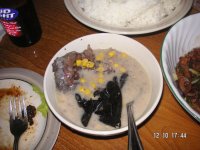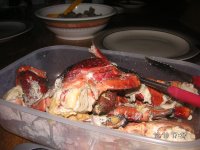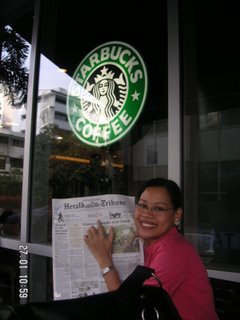When my friends came to visit me last month, I noticed that something has changed in me. I no longer hurry. Deadlines no longer govern my life because deadlines here in Saipan are not really dead lines.
My work starts at 8:30 am. I usually wake up at 7:30am and depending on the kind of sleep I had, I stay in the bed for another 10 minutes or so. I prepare my "baon" (usually a sandwich), take a bath and dress up for work in a span of 30 minutes.
Driving at 35mph, I reach the office in 15 minutes. Breakfast of coffee and sandwich follows and the day starts.
The President drops by in my office and we talk about office issues. Sometimes a little chat about our personal activities, his golf and his daughter, my badminton game and how I am adjusting to life here in Saipan.
My officemates are mostly Chamorros. Their lifestyle is very much different from what I am used to. Their attitude towards work is also unique. They lack the drive to excel. Mediocrity is common. It seems that they just want to get the day over and done with. The way they dress for office is very casual.
They usually chew bettlenut during the day. They take 15 minutes cigarette breaks in the morning and in the afternoon. Lunch break is an hour and is usually availed to the max.
During the week, when they get invited to parties, they go to the office looking wasted and groggy. Clear signs of a terrible hangover from last night's party.
A party here means drinking Bud Light and eating barbeque. Everybody here drinks Bud Light expertly. Even the girls in the office could give the guys a run for their money. Bud Light for them can be likened to Coke or maybe even water. For someone whose beer drinking limit is one bottle, I am a spoilsport.
They always party. I wonder what do they celebrate? They love to just hang out in the beach and drink beer, eat barbeque, play a bit of volleyball and just fool around. Maybe it's the island lifestyle. A lifestyle I have difficulty adapting to. <
/div>
(My fellow contract worker has assimilated himself so well in this kind of lifestyle. An expert drinker (maybe he's an alcoholic too), he could party with the locals and fool around with them. )
My job requires that I check reports and documents prepared by my officemates. I have to validate the entries in the reports. They give me the documents alright. They are fast and I don't have to wait for long. But ask them what the document contains, and you have to wait forever for their answers. They would always say, "Well, this was during X's time." or whoever was in-charge at that point. They couldn't explain the logic of things. There is something awfully missing in their line of reasoning. Call it analytical ability and I observed that very few of them, possess it. I could be wrong but when I talk to fellow Filipinos, their general comment would always be the same as mine. I know it's cruel and I could be charged with racism or something but ask every Pinoy in this island and if that Pinoy is honest enough to admit it, he would agree to my observation.
Living in such a small island and with the mighty Uncle Sam always to the rescue when you screw things up, Chamorros do not have to struggle and strive for the most basic things in life like food, shelter and even education.
The US Federal Government issues food stamps to low-income groups. Shelter could be free (with FEMA assistance during typhoons) and education is patterned after the US Public School System. (Although my impression is that the quality of Public Education here is not comparable to US Mainland standards, but that's another story). The school-bus looks very much like the school bus I see on Holywood movies.
Chamorros are generally fat people. Diabetes is an epidemic here. Since almost everybody has a car (there is no public transport here), people are not forced to walk or move around that much. The Chamorro diet usually consists of meat. A lot of meat. Barbequed ribs. Pork, chicken and beef. They don't have a lot of farmers here. So fresh vegetables and fruits are expensive. Soba or instant noodles is a daily fare. Although they live in an island, there is no commercial fishing here. There is no "palengke" or wet market where you could buy fresh fish and seafood at reasonable prices. There are few stalls that sell fish and seafood but you have to clean them yourself and they are not usually cheap. It's a lot of hassle really.
A typical Chamorro fashion is a duster with flower designs for mature people and cleavage-revealing blouses for the youngsters. Old ladies wear their dusters at Church on Sundays. Their long hair tied to a bun, with a Plumeria flower as accent and on special occasions, a 'mwar-mwar" lie on top of their head like a crown. A mwar-mwar is a crown-like accessory made of local and indigenous flowers like Plumeria (calacuchi) and Hibiscus (gumamela). A Chamorro teen-ager on the other hand would sport a long hair (usually up to their butts) with brown highlights, also tied into a bun and accented by Plumeria or Hibiscus. Their earrings are the huge, round silver type. Their blouses are cleavage-revealing type (which in the Philippines could generate various reactions depending on your body type). Their breasts and "bilbils" seem to scream, "Let me out of here. Damn it!"
They love to wear high-heeled sandals. Their toe-nails badly in need of pedicure and foot spa. Because of the limited inventory of shoes in a handful of shoe stores here in the island, the pair of shoes you wear is the same pair worn by ten other girls you'll meet on the street.
Coming from a country where music is eclectic, Chamorro music is basically a uni-sound. It's cha-cha music. A perfect background music for siesta. Try listening to it on a windy Sunday afternoon after lunch and you will know what I mean. Pinoys dominate the entertainment scene here. The best bands (although if you've seen the best in the Philippines, everything here is mediocre), are of course, you guessed it right - Pinoys!
There is only one movie house here in Saipan - the Hollywood Theater. Movies are mainstream Hollywood and box-office hit Pinoy movies. In the past 7 months, Pinoy movies such as Sukob and You are the One, have been shown here. Art and award-winning films are inexistent. This is the first time in my life wherein I never saw any Oscar nominated film in the theater. Film festivals? Forget it! (My best friend and fellow movie buff just sent me a message that the Spanish Film Festival in ongoing up to October 14 in Greenbelt. I wanted to scream, "Ibalik nyo ako sa Pilipinas!")
Movies cost $4.50 on matinees and $7 on prime-time. The theater is very small and could sit only around a hundred people. The comfort rooms (at least the girls CR) are another revelation. The doors are kindda wrong. You go inside a cubicle and people could see you from the outside because both sides are not secure. The doors are smaller than the area they are supposed to cover. I wonder who designed those doors? Some pervert perhaps? Or some idiot?
But there are things I like in the island. The sight of the beach along the Beach Road is wonderful. Clear blue waters with the calm sky as a backdrop, I experience a zen-like peace when I drive to the office. When the flame trees were in bloom, the bright red-orange colors of its flowers, is also a sight which will forever reside in my memory.
I leave my bag inside my car and it would still be there when I return. An officemate leaves her car doors open and nothing happens to the car. I don't have to open my bag for inspection when I enter a store, or a bank or any office for that matter. Banks here don't even have security guards.
I don't have to hurry everytime because I don't have to allot a certain time for traffic. Everything here in near. Even if you reside from the farthest side of the island, it would still be a breeze to travel from one end to the other end.
Seven months of dealing with the Chamorros, I learned that one should exert an effort to reach their level of thinking. It would require patience to explain transactions to them. And since, patience was never one of my virtues, I am forced to stretch it.
Their lives beat on a rhythm different from mine. I adjust because this island will be my home for the next few months. I study them and watch in fascination how they go about their daily lives. How they deal with the mundane things. I try to see not the differences but the things they have in common with me. I share their humanity and since I am just a visitor in their island, I learn what I can. I've always been interested in other people's culture and I hope that in my dealings with them, they would also see my humanity and in that brief exchange, may we both be enriched by the experience.








